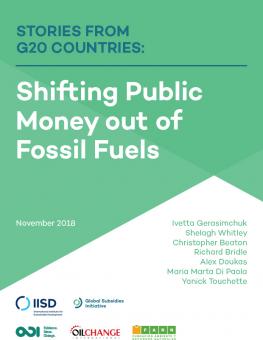
Stories from G20 Countries: Shifting public money out of fossil fuels
This analysis has brought together examples illustrating how G20 countries can learn from each other and align the flows of public money with climate targets and the Sustainable Development Goals.
Energy subsidies and tax revenues, investments by state-owned enterprises (SOEs) as well as credit support through state-owned banks and international finance institutions represent flows of public money that can either undermine or encourage sustainable development and decarbonization.
Some G20 governments have made progress in shifting at least some support away from fossil fuels and increasing their taxation. This working paper has brought together examples illustrating how reforms can be enabled and implemented to align the flows of public money with the Paris Agreement and SDGs:
- Story 1 provides the example of Indonesia as a country that saved USD 15.6 billion by reforming untargeted subsidies for gasoline and diesel in 2015.
- Stories 2 and 3 highlight recent reforms removing subsidies for fossil fuel exploration, development and production in Canada and Argentina (Spanish version).
- Story 4 features reforms in the European Union, including progress in its accountability on fossil fuel subsidies and the phase-out of subsidies for hard coal mining by the end of 2018.
- Story 5 unpacks the progress on shifting credit support from public financial institutions, including multilateral development banks, away from fossil fuels.
- Story 6 deals with the examples of SOEs in coal mining and fossil fuel power diversification in clean energy in China, India and Sweden.
- Stories 7 and 8 discuss a related issue of not just removing government support from fossil fuels, but also increasing taxation on their consumption and production, for instance in China, Saudi Arabia, South Africa and India.
This nascent positive shift of public money from fossil fuels to clean energy must occur at a much faster rate for the G20 to get on track to meeting the SDGs and climate goals. The working paper concludes with recommendations to the G20 countries for learning from each others' efforts undertaking reforms while protecting vulnerable groups and ensuring a just transition for workers and communities currently dependent on fossil fuels.
Additional downloads
You might also be interested in
COP 29 Outcome Moves Needle on Finance
In the last hours of negotiations, concerted pressure from the most vulnerable developing countries resulted in an improved outcome on the finance target, with a decision to set a goal of at least USD 300 billion per year by 2035 for developing countries to advance their climate action.
The United Kingdom, New Zealand, and Colombia Join Coalition to Phase Out Fossil Fuel Subsidies
Today on the sidelines of the UN Climate Conference in Baku (COP 29), the United Kingdom, New Zealand, and Colombia joined the international Coalition on Phasing Out Fossil Fuel Incentives Including Subsidies (COFFIS).
COP 29 Must Deliver on Last Year’s Historic Energy Transition Pact
At COP 29 in Baku, countries must build on what was achieved at COP 28 and clarify what tripling renewables and transitioning away from fossil fuels means in practice.
How Indonesia's Incoming President Can Advance the Transition to Clean Energy
With Prabowo Subianto inaugurated as Indonesia’s President, speculation abounds about the new administration’s commitment to the clean energy transition and climate targets, given Prabowo’s positioning as the “continuity candidate.” The question is, what, exactly, will be continued?